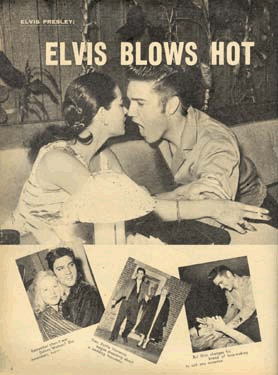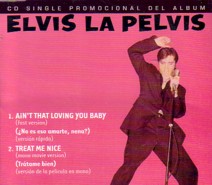

Elvis: Cultural Influence, Intolerance and Political Correctness!(by Dr Gary Enders)
As Leonard Bernstein perceptively observed Elvis Presley was the single, most influential cultural force of the 20th century. And in the new millennium, Elvis' pervasiveness in our bitterly complex and divisive society, twenty-six years after his mortal death cannot be explained simply by his music. If such a simplistic rationale or argument were sustainable, our culture would be filled on a regular and on-going basis by iconic images of The Beatles, Marilyn, James Dean and Jimi Hendrix. Certainly images of these deceased artists appear irregularly, but in their frequency none comes close to matching the almost fixed daily regularity of the Elvis name, likeness or symbol in society. This begs the question: why Elvis? While many fans relate to Elvis solely on the level of his music, others, many others, are drawn to him on more than one level. This rich, multi-layered text that is Elvis Aaron Presley transcends musical, social, cultural and religious barriers. For many fans their relationship to Elvis provides a rich narrative centered around meaning in their life. For this reason, their attraction moves well beyond Elvis' music into a neo-spiritual realm. The media regularly highlights the more obsessed fans whose homes have a room turned into a shrine, however this is not representative of the usual fan. Explaining how and why Elvis gives meaning to people is difficult to answer, in a similar way as it is difficult to explain the concept of an abstract concept like charisma. Nevertheless, the effect is not only real, but vitally important. For the effect often impacts how people go about their daily lives, how they dress, how they talk and what they do. The impact of Elvis is often nothing less than a key psychological driver in the lives of many of his fans! Elvis' multi-layered impact on society and ability to provide meaning in people's lives explains why his followers join fan clubs, why there are so many Elvis tribute artists, why Elvis is regularly seen in the local supermarket, why there is a proliferation of Elvis Internet sites and why Elvis isn't going to go away! There is a tendency, even within Elvis circles, to brutally dismiss the more obsessive fans and also those who get caught up (lost) in the conspiracy theories surrounding his death or faithfully follow the local Elvis tribute artist from venue to venue. But in dismissing these very real elements of the Elvis phenomenon one misses out on fully appreciating Elvis' power over and influence on people! Any one-dimensional view about Elvis is fatally flawed and in some ways is a 'slap in the face' to the incredible influence he had, and continues to have. Fans who are quick to dismiss the stranger elements of the Elvis world may safely remain within their own personal comfort zone, but unwittingly, not only do they dismiss the so-perceived 'oddball' element within the Elvis world, but by inference, Elvis himself. In effect, those who are dismissive are engaging in a form of Elvis 'political correctness'.
For there to be effective communion, our attitudes must change. Otherwise we will continue to experience an increase in the number of 'splinter group' fan clubs (a phenomenon worthy of study itself), the amplitude of ill will on the numerous Elvis message boards will worsen and our ability to appreciate what the eclectically diverse person that is Elvis Presley meant will be sorely weakened. There was a time when being an Elvis follower was done for altruistic reasons. By the new millennium a decidedly egoistic philosophy had assumed dominance, if not control. As I wrote in an earlier paper: Elvis: Coming Back from the Dark Age: "Falsehoods in the Elvis community are many. Regardless of overt elements of a sense of community in Elvisdom, underlying is a covert, black streak of intolerance and egocentrism that threatens to forever relegate a serious and real issue, the socio-cultural importance of Elvis Presley, to the marginal fringes of public and academic perception." What would Elvis make of all this, if he were still alive? I suspect he would view it with considerable discomfort and dismay.
Bibliography:
This article originally appeared in May 2003 as a paper in "The First Online Symposium on Elvis Aron Presley" Dr. Gary Enders passed away in late 2003 following a protracted battle with cancer.
|











